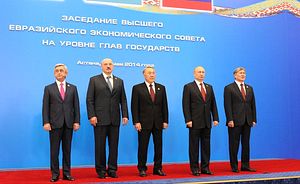Weekend reads (and listens):
The Eurasian Economic Union: As the new year approaches, so closes the first year of life for the Eurasian Economic Union. In the latest edition of Nate Schenkkan’s Central Asianist Podcast he speaks with Rilka Dragneva-Lewers of the University of Birmingham about what the EEU is on paper and what it is in reality. “Economically, it looks more than it actually is,” she says. Dragneva-Lewers also tackles the complicating issue of Kazakhstan’s recent WTO accession and the prospects of EEU and EU cooperation.
A good complement to the podcast is this article at Chatham House, by Dragneva-Lewers and Kataryna Wolczuk, which looks at Russia’s recent suspension of a free trade agreement with Ukraine and the impact of that decision — which Moscow had been threatening for some time — on relations between Ukraine and the EU and the EU and Russia.
The Illusion of Progress in Kazakhstan: Belén Fernández, for Al Jazeera America, notes that Kazakhstan’s human rights record goes largely unquestioned by the West. Fernández draws a compelling comparison between Kazakhstan and the United Arab Emirates — both have drawn criticism from human rights organizations and acclaim from Western governments:
Assisting in the presentation of a whitewashed national image is the fact that Kazakhstan has pursued a United Arab Emirates–esque model of development in its showcase capital of Astana. The logic goes something like this: The more ostentatious buildings and malls you have in a place, the less folks will notice its oppressive foundations.
Fernández focuses in on Nazarbayev University — where nearly every high-profile visitor to the country this year has delivered their big speeches — writing that it “encapsulates the whole charade.”
Other Kazakhstan stories worth reading: Joanna Lillis dives into the Mayor of Almaty’s seemingly radically transparent social-media driven initiative to address the concerns of citizens.
Central Asia 2050: Have your block of salt ready; we’re talking about the future. A recently-released report — based on research conducted by a group of experts gathered by the Emerging Markets Forum — looks at Central Asia 35 years hence and offers an overwhelmingly optimistic outlook. In order to enhance growth, encourage inclusion, and ensure sustainability, the report highlights seven policy areas: energy, agriculture, manufacturing and services, human development, climate change, regional cooperation, and institutions. They throw in water management as an eighth area. In order to prosper, regional states will need to “complete four simultaneous transformations”:
[F]rom rural to urban societies; from resource based to diversified economies; from command and control economic management to market oriented systems; and from Soviet legacy institutions to those which are inclusive, transparent and accountable.
Failure to navigate these transformations, the report contends, is the biggest risk. The report, noticeably, doesn’t mention human rights at all and seems to assume the present economic strife in the region will not persist. It seems a herculean task to complete all four of the transformations mentioned simultaneously.
Other stories you’ll need your block of salt for: An alarmist piece in the Wall Street Journal which reiterates the old yarn that Central Asia is at serious risk thanks to Afghanistan. The headline “Central Asia Fears Afghan Contagion” could have been printed in any of the last 35 years.

































